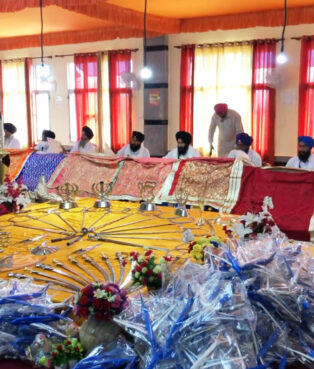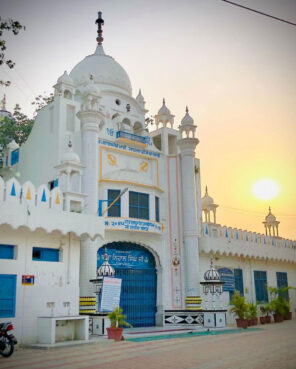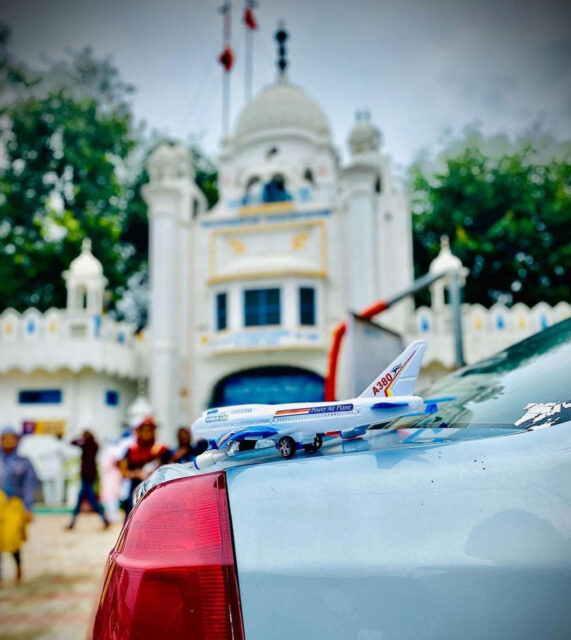JALANDHAR, India (RNS) — Standing near a fragile brick wall of a Sikh temple in the scorching heat, a 23-year-old farmer hovers over the toy airplanes stacked on a wooden plank. Life has taken an unexpected turn in the last few weeks for Tejinder, and he has pinned his last hopes at a Gurdwara on an offering: a mini Boeing 747.
Tejinder, who requested to be identified only by his first name, has had his plans to move thrown into disarray by the diplomatic row between India and Canada. On a video call with his mother, who lives in Toronto with the rest of the family, he told her, “I just don’t know how to get out of here now.”
She replied: “To hell with Trudeau and his useless tongue.”
On Sept. 18, Canadian Prime Minister Justin Trudeau, speaking to the House of Commons, accused “agents of the government of India” for the killing of Hardeep Singh Nijjar, a 45-year-old Sikh leader and a Canadian citizen, who was slain by masked gunmen in June, near Vancouver, British Columbia. New Delhi dismissed the accusations as “absurd” and lashed out at Canada for offering what it says is a “safe haven” to people India accuses of terrorism, including Nijjar.
In a quickly escalating situation, both countries expelled top diplomats and halted the trade talks; India suspended all visa applications for Canadians, which includes a large Sikh diaspora, and warned of “growing anti-India activities and politically condoned hate crimes.”
Since Tejinder’s mother moved to Canada three years ago, he has been scheming to follow her. However, his most recent visa application got rejected again. “I just want to live with her,” he said, standing on the shining marble porch of his two-story home in a village outside Jalandhar, in Punjab. He lives alone here.
Thousands of families in Punjab — who have migrated for the Big Canadian Dream for decades — have found themselves left in the lurch by the transnational crisis. An elder cousin of Tejinder, who lives next door, is supposed to be married in December. While the venues and caterers have been booked, the family that remains in India isn’t very sure of the Canadian bride-to-be’s presence.
On Thursday, Tejinder visited the Talhan Gurdwara, a Sikh temple located outside Jalandhar. As urban legend goes, a toy airplane offered at the 150-year-old Gurdwara, popularly known as the “Visa Temple,” gives flight to the dreams of moving abroad.
Away from the city’s bustle, the Talhan Gurdwara is surrounded by lush fields of wheat and sugarcane, checkered by narrow streams. The shops that line up in front of the temple have Canadian flags in every form: head scarfs, key chains, jute bags, bracelets and, of course, on toy airplanes.
Thousands of devotees line up every morning outside the gurdwara wishing for a divine intervention in their visa applications. Gurdeep Singh, a 40-year-old cloth retailer from Jalandhar, woke up with the sun Thursday to visit the temple with his wife and a close friend. Fourteen members of his family, including his twin sons, age 5, live in Canada.

Mounds of toy airplanes pile up on tables inside Talhan Gurdwara. Photo courtesy Talhan Sahib Instagram
“I’m the only person left behind with my wife,” he said, the white hair in his beard flashing in the sunlight. “Our children tell us about the clean cities and a better quality of life there. I’ve also applied for the visa.”
He climbs up a floor and walks toward the main prayer hall of the temple, where the devotees bow down to the holy Scripture, Guru Granth Sahib, and offer mini Boeings — despite a ban on the practice by the head Golden Temple, in Amritsar. In a corner of the hall, lit by low-hanging chandeliers, sits Balwinder Singh, his eyes tightly closed.
“It is my birthday today,” the 22-year-old says later, walking out of the hall. He didn’t wish for a visa. Not today. “My sister moved to Canada two years ago. I prayed for her well being in these circumstances.”
The exodus to Canada has a long history for Sikhs in Punjab, Paramjit Singh Judge, a retired professor with a doctorate in political sociology and former president of the Indian Sociological Society, told Religion News Service. “The migration started toward the end of 19th century, a practice that’s 125 years old,” he says.
“In India, the Sikhs, or Punjab, are not part of the mainstream politics,” he said. India’s 543-member parliament has only 13 representatives from the Punjab state. Whereas, Judge said, in Canada, which is home to the largest Sikh population outside India — roughly 2% of the national population — they are an influential constituency.
An agrarian crisis caused by overuse of soil, controversial farm laws and a rampant drug crisis has paralyzed Punjab’s youth for over a decade. A shot at life abroad is often the brightest possibility for many, said Balwinder Singh, the devotee.
“Last year, I learned to repair the ACs (air conditioners), but nobody is willing to pay me here,” he said. “In Canada, there is money and respect for skilled labor. It is better than corporate jobs in India.”
Singh’s sister works part time at Tim Hortons, a popular Canadian coffeehouse chain. His gallery is full of her photos in well-lit frames. The young man was brought up in a colony designated for retired armed forces personnel in Jalandhar. “It is not the same place anymore,” he said. “Everyone has moved abroad in the last few years. First children, then parents and now grandparents. It is like a ghost town sometimes.”

Talhan Gurdwara, a Sikh temple located outside Jalandhar, is home to a rising tradition involving toy airplanes. Photo courtesy Talhan Sahib Instagram
The killing of Nijjar, the Canadian-Sikh leader, and the following reported warnings to Sikh activists globally has swept the diaspora with anxiety. Nijjar, who worked as a plumber, also was an activist at his local gurdwara, organizing for a symbolic referendum for an independent Sikh state in India, known as Khalistan.
In India, the movement goes back decades and is punctuated by several bloody incidents, including the 1984 anti-Sikh riots in Delhi after the assassination of India’s then-Prime Minister Indira Gandhi, who had ordered the crackdown on Sikh militants in the Golden Temple that left over 400 killed. In 1985, Canada had its own tragedy, when a plane bombing killed 329 people onboard, including 268 Canadian citizens and 24 Indian citizens. A Sikh militant and Khalistani separatist group was implicated in the attack, with one Sikh immigrant from India pleading guilty.
The separatist movement is banned in India, and polls show most Sikhs are proud of their Indian identity. Even so, the Modi government has swiftly clamped down on any hint of the ideology, considering it a threat to its Hindutva politics.
“Our activists, young people who dare to talk, are in jails,” said Tejinder, a devotee at the Talhan Gurdwara. He categorically denies he supports the idea of Khalistan. “India is never going to let that happen. But I want to get out of here at first chance. We don’t even get basic rights.”
Vinod Kumar, the chairperson of the Punjab University’s sociology department, argues that India’s response to the Canadian accusations was “immature.”
“It was also a show of Hindutva strongmen politics to the Sikh population in India,” he said. And, above all, he adds, it was a move by both sides to secure their next election, with both Trudeau and Modi appeasing their own constituencies.
“The biggest losers in the outcome of this diplomatic crisis would be the Sikh diaspora,” said Kumar, who has expertise in the Sikh diaspora and migration. “The Punjabis who are eyeing to settle in Canada will end up suffering here. This will also lead to discrimination against the diaspora abroad itself.”
The flight of toy airplanes sacrificed at the Gurdwara ends next door at an extravagantly large hall for community lunch. Jagdeep Singh, 45, sits guard at the gate, giving away the airplanes to every kid he can. He has been doing this every day for the last seven years. But he has never offered one for himself, he says. Neither has he ever set a foot outside of Punjab.
His family of four lives off $120 every month and some food allowances from the Gurdwara. “I recently started sending my children to a private school so they can learn English,” he said. He hopes to send his children to Canada — a multi-thousand dollar affair.
“If this Gurdwara wills, my children would take a flight, too, someday.”





